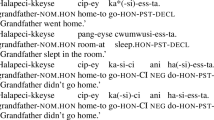Abstract
This paper argues for the necessity of zero pronoun annotations in Korean treebanks and provides an annotation scheme that can be used to develop a gold standard for testing different anaphor resolution algorithms. Relevant issues of pronoun annotation will be discussed by comparing the Penn Korean Treebank with zero pronoun mark-up and the newly developing Sejong Teebank without zero pronoun mark-up. In addition to supportive evidence for zero marking, necessary morphosyntactic and semantic features will be suggested for zero annotation in Korean treebanks.
Preview
Unable to display preview. Download preview PDF.
Similar content being viewed by others
References
Asher, N.: Reference to Abstract Objects in Discourse. Kluwer Academic Publishers, Dordrecht (1993)
Carletta, J.: Assessing Agreement on Classification Tasks: the Kappa Statistic. Computational Linguistics 22(2), 249–254 (1996)
Dickinson, M., Meurers, D.: Detecting Inconsistencies in Treebanks. In: Proceedings of the Second Workshop on Treebanks and Linguistics Theories(TLT 2003), Växjö. Sweden (2003)
Han, C.-H., Han, N.-R., Ko, E.-S., Palmer, M.: Development and Evaluation of a Korean Treebank and Its Application to NLP. In: Proceedings of the 3rd International Conference on Language Resources and Evaluation, LREC (2002)
Han, N.-R.: Korean Null Pronouns: Classification and Annotation. In: Proceedings of the ACL 2004 Workshop on Discourse Annotation, pp. 33–40 (2004)
Hong, M.: Centering Theory and Argument Deletion in Spoken Korean. The Korean Journal Cognitive Science 11(1), 9–24 (2000)
Iida, M.: Discourse Coherence and Shifting Centers in Japanese texts. In: Walker, M., Joshi, A.K., Prince, E.F. (eds.) Centering Theory in Discourse, pp. 161–182. Oxford University Press, Oxford (1998)
Lee, S., Byron, D., Gegg-Harrison, W.: Annotations of Zero Pronoun Resolution in Korean Using the Penn Korean Treebank. In: The 3rd Worksop on Treebanks and Linguistics Theories (TLT 2004), Tübingen. Germany, pp. 75–88 (2004)
Walker, M., Iida, M., Cotes, S.: Japanese Discourse and the Process of Centering in Computational Linguistics, 20(2), 193–232 (1994)
Dictionary Yonsei Korean Dictionary, Dong-A Publishing Co. (1999)
Guidelines of the Sejong Treebank. Korea University
Author information
Authors and Affiliations
Editor information
Editors and Affiliations
Rights and permissions
Copyright information
© 2005 Springer-Verlag Berlin Heidelberg
About this paper
Cite this paper
Lee, SH., Byron, D.K., Jang, S.B. (2005). Why Is Zero Marking Important in Korean?. In: Dale, R., Wong, KF., Su, J., Kwong, O.Y. (eds) Natural Language Processing – IJCNLP 2005. IJCNLP 2005. Lecture Notes in Computer Science(), vol 3651. Springer, Berlin, Heidelberg. https://doi.org/10.1007/11562214_52
Download citation
DOI: https://doi.org/10.1007/11562214_52
Publisher Name: Springer, Berlin, Heidelberg
Print ISBN: 978-3-540-29172-5
Online ISBN: 978-3-540-31724-1
eBook Packages: Computer ScienceComputer Science (R0)




